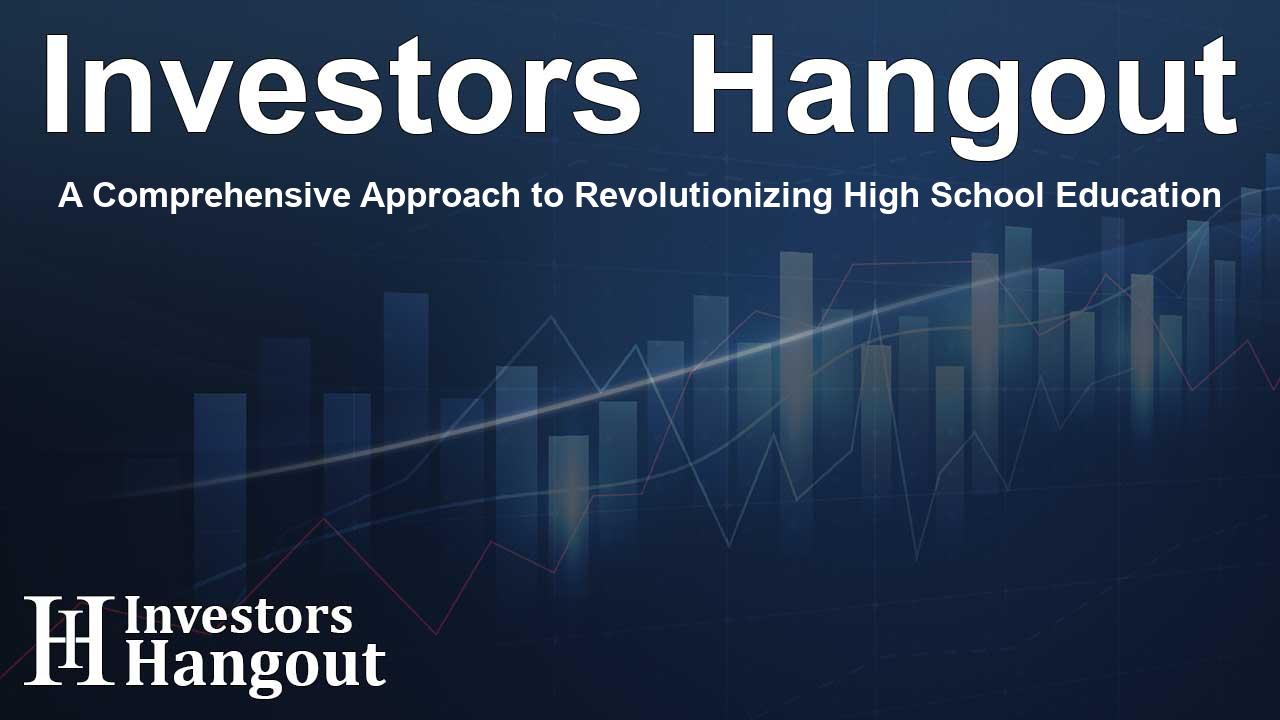A Comprehensive Approach to Revolutionizing High School Education

Transforming High School Education for Today's Needs
The recent research and development (R&D) agenda introduced by the Carnegie Foundation lays out a bold vision to revolutionize American high schools. This innovative blueprint aims to shift from traditional, time-based learning methods to a more dynamic, competency-oriented approach. The goal is clear: to prepare students for active participation in society and an increasingly complex economy.
Launching this initiative signals a crucial moment for education reform. Dr. Timothy Knowles, President of the Carnegie Foundation, emphasized the urgency of the transformation. He stated, "American education is at a crossroads. While we hurtle toward an AI-driven economy that demands skills like creativity, critical thinking, and adaptability, our high schools are trapped in an outdated architecture... This agenda is about building knowledge and tools... for schools marked by ambitious goals that foster engaging and rigorous learning experiences."
Key Priorities of the R&D Agenda
The R&D agenda identifies eight key interconnected research priorities designed to facilitate this transformative shift. These priorities are critical for moving high school education beyond the century-old system that relies on the Carnegie Unit for measuring student progress. The following categories highlight actionable steps detail how schools can implement these changes:
- Create a shared vision among communities for high school transformation.
- Establish a supportive learning culture that nurtures student and educator connections.
- Empower educators by reimagining their roles and working conditions.
- Revise the high school canon to ensure engaging, rigorous, and experiential learning that transcends the constraints of seat time.
- Develop learning ecosystems that connect high school with postsecondary and career opportunities.
- Enhance student access to credible credentials throughout high school.
- Implement valid assessments that capture comprehensive evidence of learning.
- Facilitate tools and methods for educators to engage families in student success.
Addressing Current Challenges in Education
The introduction of this R&D agenda is particularly timely. Since recent global events, high schools have faced significant challenges, including rising absenteeism, increasing student disengagement, and educator burnout. The traditional diploma does not reflect the skills needed in today's job market, leading to decreased enrollment in four-year colleges and increased economic insecurity for many individuals. This new agenda is designed to not only tackle these immediate concerns but also to set a course for future improvement in educational outcomes.
Building a Collaborative Framework
The Carnegie Foundation's commitment extends beyond just outlining priorities; their collaborative approach involves working with various stakeholders, including researchers, practitioners, and education policymakers across the nation. This collaboration is essential for developing effective methods and practices that yield positive results. Dr. Brooke Stafford-Brizard, a key figure in the initiative, pointed out, "Transforming American high schools requires unprecedented collaboration... Only through concerted efforts can we guarantee that high school transformation becomes a widespread reality, benefiting students everywhere."
As these goals are pursued, the Carnegie Foundation envisions a concerted effort from 2023 to 2035. This will include generating evidence through three primary research domains: Discovery Research, Development Research, and Impact Research. Together, these avenues will explore and evaluate current educational practices and identify innovations to enhance student learning.
Looking to the Future
Ultimately, this comprehensive R&D agenda aims to redirect national resources and focus towards reshaping American high schools into powerful engines of opportunity. By cultivating environments that prioritize student success and adaptability, the Carnegie Foundation is committed to ensuring that every student experiences a transformative high school journey that equips them for future success.
Frequently Asked Questions
What is the main goal of the R&D Agenda?
The primary goal is to transition from a time-based education model to one that emphasizes competency-based learning to better prepare students for modern society.
How many research priorities are outlined in the R&D Agenda?
There are eight interconnected research priorities designed to guide the modernization of high school education.
Why is collaboration emphasized in this initiative?
Collaboration is essential for generating effective solutions that can lead to widespread changes in high schools across the country.
What evidence will be collected to support this transformation?
Evidence will be gathered through discovery, development, and impact research to evaluate current practices and assess the effectiveness of new models.
How long is the Carnegie Foundation committed to this project?
The foundation aims to work on this initiative from today through 2035, ensuring long-term support and development in high school transformation.
About The Author
Contact Riley Hayes privately here. Or send an email with ATTN: Riley Hayes as the subject to contact@investorshangout.com.
About Investors Hangout
Investors Hangout is a leading online stock forum for financial discussion and learning, offering a wide range of free tools and resources. It draws in traders of all levels, who exchange market knowledge, investigate trading tactics, and keep an eye on industry developments in real time. Featuring financial articles, stock message boards, quotes, charts, company profiles, and live news updates. Through cooperative learning and a wealth of informational resources, it helps users from novices creating their first portfolios to experts honing their techniques. Join Investors Hangout today: https://investorshangout.com/
The content of this article is based on factual, publicly available information and does not represent legal, financial, or investment advice. Investors Hangout does not offer financial advice, and the author is not a licensed financial advisor. Consult a qualified advisor before making any financial or investment decisions based on this article. This article should not be considered advice to purchase, sell, or hold any securities or other investments. If any of the material provided here is inaccurate, please contact us for corrections.
